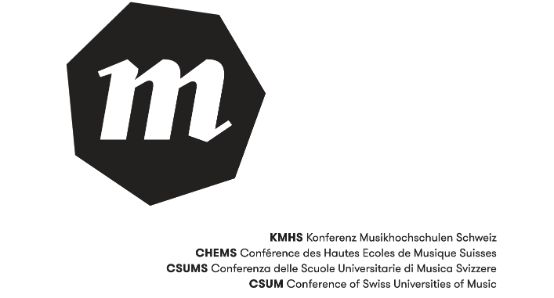Student as author of his/her curriculum
The Conference of Swiss High Schools of Music organized its Tag der Lehre on Friday, October 21, which brought together in Lausanne the extended management of the country's high schools of music.

Antoine Gilliéron - The notion of freedom within Swiss higher music education courses has been questioned through concrete examples: this article aims to serve as a summary of the discussions by presenting the results of this day of educational exchange.
The opening lecture given by Elisabeth Gutjahr, rector of the Mozarteum in Salzburg and vice-president of the European Association of Conservatories, highlighted the main areas of reflection that shaped the debates that followed:
Vision and values: what is a free person (at all levels)?
Didactics: what is our idea of learning?
Pedagogical engineering: what structure for curricula and teaching?
Institutionnel : quelle relation entre des individus libres et le collectif qui agit aussi librement ?
Évaluation et standards : quelle réussite à l'apprentissage ?
Équilibre : quel degré de liberté insuffler dans les cursus d'études ?
À l'instar des articulations du corps humain avec des mobilités différentes (un poignet ne bougeant par exemple pas de manière similaire à une épaule ou à un cou), la question du curseur a d'emblée été posée, and this in contextualizing what is possible or not to realize within the framework of Bologne, in the light of the philosophical contributions of Jacques Rancière, author of the book "Le maître ignorant, cinq leçons sur l'émancipation intellectuelle".
The cinquantaine of participants on this day was then divided into huit focus groups. During the morning, these groups discussed the potentials and benefits of structuring the curricula more freely, whether from an academic (from a pedagogical or administrative point of view) or a social (according to the social impact and employability of the research) perspective.
The results in terms of profits have demonstrated these elements: a necessary change of paradigm ; a reinforcement of the administrative responsibility of students ; a spirit of openness spread across all sectors of the community ; more horizontal relations ; a reduction in the institutional administrative burden ; a potential increase in employability ; facilitated links with other institutional partners ; a reinforcement of concrete projects on the ground; inclusiveness and diversity at the heart of the teaching system; transformation of ECTS credits into an even more artistic and even potentially free content; fewer problems with human resources linked to missions that carry more meaning; breaking down the cliché of "schools-music" so that they tend to become even more lively platforms; pedagogy that could become even more innovative.
Following a presentation of existing models at the School of Commons of the ZHdK, Open Creation of the Basel Music Academy and Freiform of the FHNW, the aim of the morning's focus groups was this time to concentrate on the concrete implications and limitations of a more flexible curriculum, from the same two angles this morning (i.e. academic pedagogy/administration and global social impact/employability).i.e. academic pedagogy/administration and global societal impact/employability).
The balance in terms of limitations is thus presented: detailed description of the free modules so as not to lose quality; vigilance at the level of international mobility (Erasmus); academic management logic that is not yet sufficiently agile; evaluation of the free forms that needs to be reinvented; volatile and provisional nature of the organization that can destabilize it; the logic of auto-entrepreneurship at the level of society that is being questioned; the need to move towards freedom (with progression and differentiation); the management of human resources that could become more complex; the individualization of courses that is more complicated than generalization; the professional competences that must also be included in the liberal forms by replacing the professional milieu.
Finally, a summary of the day was presented by the students and Philippe Dinkel, former director of the HEM in Geneva-Neuchâtel, to conclude this day of teaching. The conclusions, while paying tribute to artisanship, discipline and excellence, helped to ease the tensions facing the country's music schools: patrimoine et création ; individu et collectif ; institution et innovation ; processus d'apprentissages et apprentissages spontanés ; dignité du métier de musicien-ne et autonomie ; créativité et assurance qualité ; autorité et horizontalité ; institutionnel et non-institutionnel ; tradition et nouveaux métiers ; fixité et fluidité ; marché du travail et volonté de changer ou réparer la société.
The concept of freedom, which is reminiscent of ancient Greece and has been present in all philosophical movements since then, requires responsibility, maturity, trust, critical thinking and respect, which is valid for all segments of society. The solutions for Swiss music colleges should therefore be based in particular on the ideas of lifelong learning, a better selection of students while being aware of the profiles being researched and the institutional identities involved, of the development of expanded artistic communities (physically and numerically), of the increased encouragement of student initiatives, and - even though "art is born of constraints, lives of struggle, lives of freedom" according to André Gide - of the... flexibilization of the study paths.








